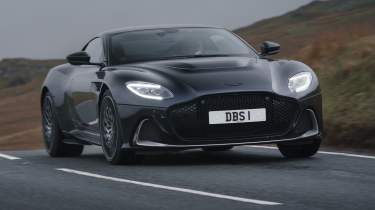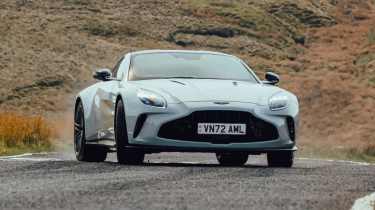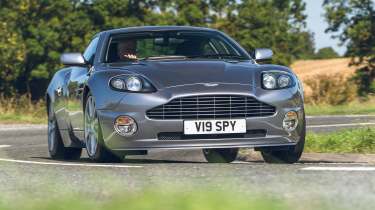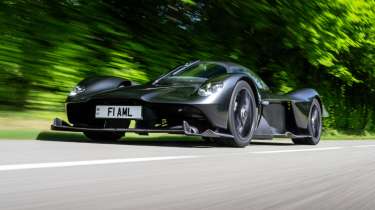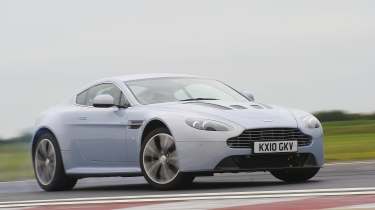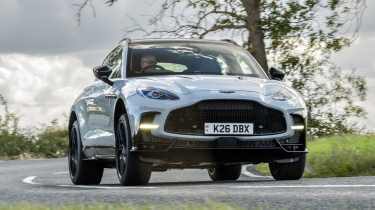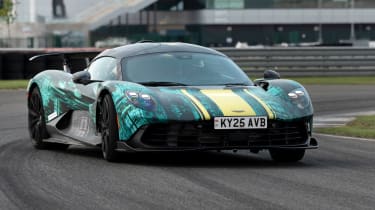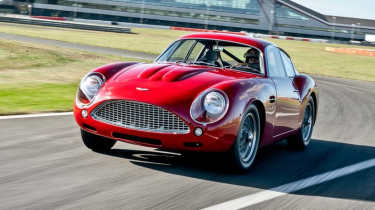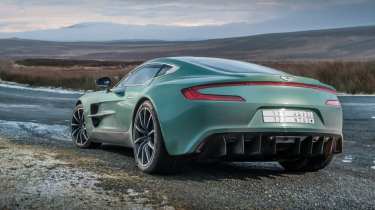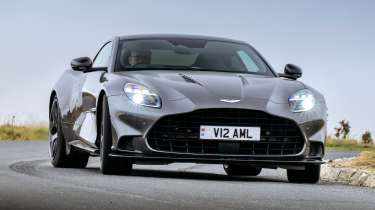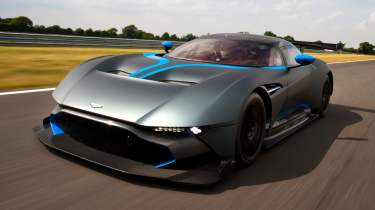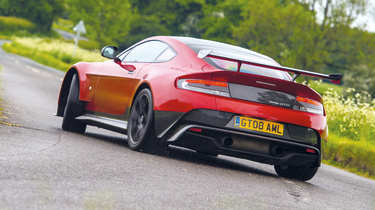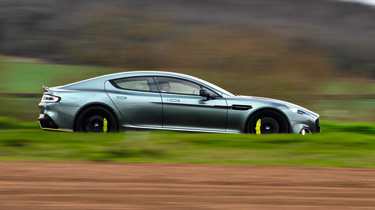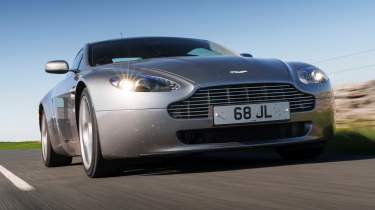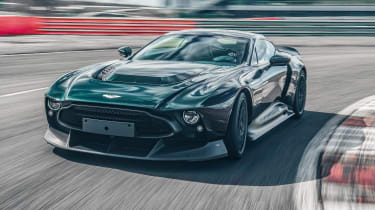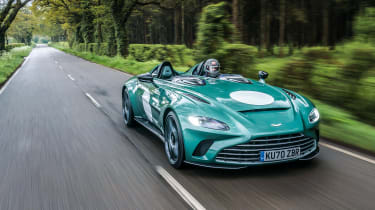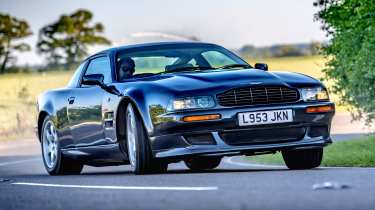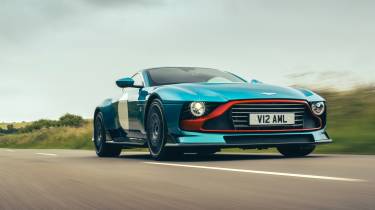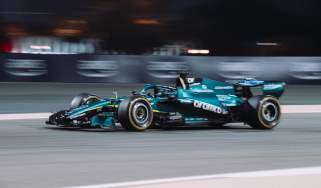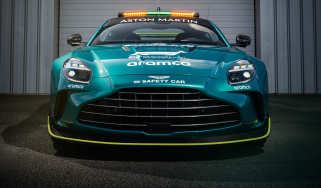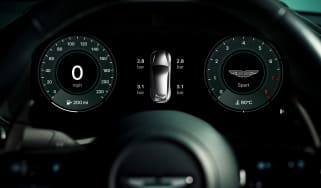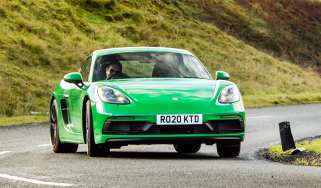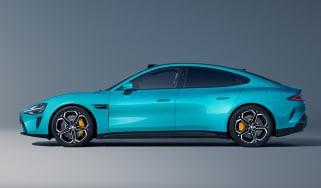Best Aston Martins – from brutes in suits to howling hypercars
Aston Martins often trade heavily on emotion, but there are a few that are revered by the evo team that are as beautiful to drive as they are to look at. These are Gaydon’s finest models of all time
Aston Martin, often the underdog in comparison to its Modenese rivals, has traditionally traded on treading the fine line between sports cars, supercars and grand tourers. Do they always dominate group tests or the cold objective world of spec sheets? Rarely, but there’s not a long-serving evo contributor that hasn’t fallen in love with an Aston or three over the years.
Today, the marque has spread its proverbial wings further than ever, offering everything from the Valkyrie and Valhalla, a Le Mans hypercar with number plates and a carbon-tubbed hybrid supercar, to the DBX S, a super SUV that’ll stomp some supercars around Anglesey before heading off to do the school run. The rest of the lineup has never been stronger either, with the DB12, Vantage and Vanquish probably the strongest core Aston trifecta we’ve ever seen. The products need no excuses and make no compromises. Now it just needs to sell them…
Aston Martin DBS 770 (2023)
The DBS Superleggera, or just the DBS as it eventually became known, like many of those Palmer-era cars, had an air of incompletion about it. It epitomised the brawn and beauty balance that only Aston seems to master but without the absolute last tenth of chassis finesse, of rear axle control and of transparency, that makes a performance car truly spectacular. But Aston has a habit of iterating, reaching close to perfection often at the last minute and only for a limited few. And so to the DBS 770 Ultimate, we look; the run-out special that he standard DBS – undoubtedly a great car in its own right – always should have been.
Yes, there’s more power – a bump up 44bhp to 759bhp to be precise – but the DBS was never short on that. It’s the subtle stuff under the skin that ties it all together. With its stronger front subframe and solidly mounted steering column, the DBS 770 ups the feel and engagement with the driver, while the updated dampers give it a hair more control of its own mass over a road. John Barker highlighting that the ‘sport’ setting for the suspension is the sweet spot on the road, in a world where many performance cars have to be in ‘comfort’ to be tolerable, probably says all you need to know about how deftly executed the DBS 770 was. A shame then, that just 499 of them were made in total. We hope the Vanquish picks up where the DBS 770 left off.
Aston Martin Vantage (2024)
The DBS 770 was sort of the spark to start a blaze of great form from Gaydon, carrying well into its new generation of so-called super tourers and sports cars, first with the DB12 and then, the Vantage. As we found on the launch of the updated car earlier this year, the new Aston Martin Vantage is Gaydon's sports car debug, offering balance, communication, response and performance, in the finely-judged measures and with a level of coalescence Aston lovers have always dreamed it could muster some day. Of course, the tradeoff is that the new Vantage isn’t quite as refined a continent crosser as its softer-edged grand touring stablemates are.
You could argue a bump in power from 503bhp to 656bhp might seem overkill, too. Yet it only speaks to Aston’s ambitions for the Vantage to graduate from Carrera S-fighting middleweight to Turbo S-busting heavyweight; from sports car to supercar-adjacent. The rest of its composition, from the chassis to the steering, to the balance, is complemented by the power rather than overwhelmed by it. It’s a masterclass.
Aston Martin Vanquish S (2004)
The original Aston Martin Vanquish of 2001 was the genesis for Aston as we know it today. While the DB7 pioneered the broad silhouette and Ian Callum-penned proportion-lead beauty, the Vanquish brought the revolutionary extruded aluminium chassis structure to bear. But even with that spectacular V12, innovative underpinnings and carbon kevlar bodywork that clothed it, as is so often the case with Aston, there was more potential left on the table.
Enter Vanquish S in 2003, with a bump in power to 520bhp from 460bhp and a glob of much-needed speed and response for the still-shonky automated manual transmission. But it was the subtle tweaking of the steering and suspension that allowed the Vanquish S to come into its own. Was it a car that ever really became all it could be? Probably not. But it stands broad-shouldered in the pantheon of Aston’s super GTs.
Aston Martin Valkyrie (2023)
Could anyone in 2001 have imagined anything like the Aston Martin Valkyrie would ever exist, let alone that it would come from Aston Martin and in less than 20 years? With a Formula 1 mindset from conception to construction, with a screaming 11,100rpm V12 heart courtesy of Cosworth and Adrian Newey-honed aerodynamics, it’s not really like any other production car yet made.
The engine, the looks, the dedication to the concept, and the pure shock value are utterly undeniable. It’s the fact that in many ways (but definitely not others) it blindsides you with what a sweet road car it is, which came as a total surprise. Deputy editor James Taylor discovered as much on his 700-mile road trip to Le Mans, where the Valkyrie revealed what a smooth, controlled ride that clever interconnected hydraulic suspension afforded it.
If only the rest of the experience weren’t totally and utterly undermined by the borderline intolerable noise within the cabin. The Valkyrie is one of the best sounding supercars of all time from the outside. On the inside, it’s like being trapped in a chain-driven washing machine full of bolts. It’s also ruinously expensive to look after and temperamental to operate at anything other than flat-out speeds. Yet none of that was ever going to get in the way of its status as a sheer mythical monolith in the history of Aston Martin.
Aston Martin V12 Vantage (2009)
Big engine, little car. It’s a formula that produces cars that are almost always huge on charm but often lacking a little in balance. Not so with the V12 Vantage. Shoehorning the 5.9-litre V12 – in rorty 510bhp spec as in the Aston Martin DBS – under that bonnet can’t have been the work of a moment or of meagre minds, but somehow they made it work and crucially, made the whole car work around it.
There’s muscle car character, yes, but it’s not belligerent, certainly not in the company of what were some of its key rivals at the time like the Corvette ZR1 and Porsche 911 GT2. We hailed it as the best car Aston made at the time, for the way it blended brutality and beauty, pugnaciousness and poise. One of the most beautiful, exciting and engaging cars of its day and a worthy north star to which we hope Aston looked when shaping the character of the new Vanquish.
Aston Martin DBX S (2025)
When Aston Martin announced it was to join the SUV furore there must have been more than a few concerned looks exchanged between evo readers. But with promises of a sophisticated, bespoke aluminium structure and the same focus on dynamics, performance and style that you’d expect of any other car to wear the wings, there was hope against the at-a-glance odds, that this would be a proper Aston. It wasn’t unfounded, with the DBX impressing right from the off, albeit with room to grow and improve. The DBX707 was the iteration that made the DBX all it should be and the DBX S edged it forward again.
Even among stiff competition from Porsche, Mercedes-AMG, BMW and now even Range Rover with the excellent Range Rover Sport SV, the new DBX S might just be the pick of the pack. Its dynamic character is tantamount to witchcraft, dispensing with that 2245kg weight and high driving position to deliver a natural, collaborative, even playful driving experience. Compared to the standard DBX, the wet-clutch nine-speed Speedshift gearbox is much more up to the job of hustling between cogs. There’s also an electronically-locking rear diff that can take all of the DBX’s 664lb ft if the systems decree it necessary, and make sure the right wheels are spinning to let the tail run wide under excess power. As for the damping? Only Ferrari's Purosangue – shod with trick Multimatic dampers and configurable to double the price – can bloody its nose for body control. The cherry on the cake is that the interior is finally to a proper standard, with the Vantage style overhaul carrying over from the upgraded DBX707. It really is unironically one of the best cars Aston Martin has ever made. Blasphemy, we know…
Aston Martin Valhalla (2026)
While we’ve yet to drive a fully production representative Valhalla, our go in the prototype revealed that all the hybridisation, four-wheel drive and technical sophistication actually coalesced into a biddable supercar that actually liked to play.
Indeed the Aston Martin Valhalla with its hybridised V8 and four driven wheels breaks even more new ground than the Valkyrie for Aston. It’s also got more competition, being positioned as it is just above the Ferrari 849 Testarossa and Lamborghini Revuelto and decently below (in terms of price if not performance) the Ferrari F80 and McLaren W1.
It’s been developed with the assistance of Aston’s F1 team, features a flat-plane crank version of Mercedes-AMG’s 4-litre V8 bolted to a carbon chassis and augmented by three electric motors, for 1064bhp. Two of those have a front wheel each to power. The entertaining supercar the Valhalla has turned out to be could very easily have been lost in the complication and technical noise. That it appears not to have been is a testament to Aston’s development engineers. Final verdict to come, but all signs point to a truly great supercar that happens to come from Aston Martin.
Aston Martin DB4 GT Continuation (2021)
If any Aston could be described as being at the opposite end of the spectrum to the marque’s brutish super SUV, it’s this, the DB4 GT Continuation. Quite literally an old car made new, the DB4 GT Continuation is one of a run of cars made to be sold alongside the DBS GT Zagato within the DBZ Centenary collection. Just 19 pairs of cars were built to mark 100 years of the Italian carrozzeria, with the DBS the modern roadgoing portion and the DB4 the Newport Pagnell-built, panel-beaten track-only classic portion.
And therein lies the genius of the DB4 GT Zagato, for it puts those 19 buyers back in touch with the joys of historic motoring, reminding us of just what a joy a racing car from the golden era is to drive. It’s a barrage of undiluted sensations, unfiltered and unfettered by adjustable systems, meddling software and heavy-duty hardware. It’s a car that demands entirely alien inputs to those of a modern performance car but still, that they are applied with forethought, precision and delicacy. This is a car you need to find a rhythm with, to unlock the throttle-steerable rear end, to fully exploit the steering and to push those high-sidewall tyres into their window. Patience, re-education and appreciation for what the DB4 GT Zagato is are limitlessly rewarded. Would the Hollywood star that is the DB5 be the pick of most as an all-time great Aston Martin? Probably. But for those with evo sensibilities, the DB4 GT Zagato embodies what we want in an old Aston.
Aston Martin One-77 (2009)
On the reveal of the Valkyrie project and throughout its gestation, there was an underlying conversation about what an Aston Martin should be. For diehards, nothing other than a front-engined, rear-driven super GT deserves to wear the wings and as such an Aston Martin hypercar shouldn’t be anything like the Valkyrie. It should be more like the Aston Martin One-77 of a decade earlier.
A Cosworth-fettled V12 and carbonfibre chassis it might have, but it sets that howling 750bhp, 7.3-litre mill ahead of the passenger cell – albeit still in a front-mid position partly under the endless sprawling bonnet and partly under the windscreen and dashboard. To look at the One-77 is Aston Martin as you know it, exaggerated in every direction. It’s not got the Valkyrie’s billowing venturi tunnels and porous carbon bodywork to bully the air into downforce development. In fact, the bodywork of the One-77 is aluminium. But it’s wider, lower, with broader hips, a longer bonnet and a bigger mouth than any other traditional Aston Martin.
At the back, the Aston ‘wing’ lights are width-spanning LED-shod single element – very ahead of its time – while the full hatch and decent boot of ‘normal’ Astons made way for an opening rear window that reveals a boot full of exposed suspension and bracing, albeit in a bed of sumptuous leather. As above; Aston as you know it, in the extreme.
The evo team discovered as much was true about the driving experience during a two-part test over a decade ago, when we exposed the One-77 to both a track drive around Millbrook and a tour through North Wales. There’s an extremeness to it – the way the clutch slips and the car jerks at low speeds is almost race car-like, just like the sound and response of the V12 engine. It’s a visceral challenge by all accounts, that you undertake from a leather-bound, carbon and aluminium-trimmed boudoir. It’s Aston Martin triple distilled.
Aston Martin Vanquish (2025)
The One-77 is fairly forgotten by hypercar standards in the wider car enthusiast community but clearly not in Aston’s own design department. The latest round of GTs and sports cars, from the DB12 and V8 Vantage, to the new Vanquish flagship, are massive nods to Aston’s original hypercar styling wise. They’ve got the hips, they’ve got the mouth, even the stretched lights. The Vanquish being the flagship, of course, has a V12, albeit a turbocharged one. And such is progress, it’s a V12 with an additional 74bhp compared to the multi-million-pound few-off.
> Who makes the best V12 supercar? Ferrari, Lamborghini and Aston Martin go head-to-head
The Vanquish also leads a lineup of Aston Martins that’s perhaps the strongest it’s ever been. These are cars for which no excuses need to be made, cars that stand toe-to-toe with rivals on dynamic merit, without apologies for compromises. For probably the first time since the original Vanquish and the 550 Maranello battled it out almost 25 years ago, the Aston actually has more power than the Ferrari against which it is positioned. And the rest of the car is there to meet that brute force.
You wouldn’t imagine 824bhp and 737lb ft could be effectively contained by just the rear wheels, but the Vanquish doesn’t just feel like a missile. It has balanced handling, its engine can be enjoyed without bonfiring the rear tyres. That’s obviously possible – big smokey drifts are foremost in the Vanquish’s talents should you ask, but it isn’t a one trick pony. Rather a consummate all-round super GT of a quality we wouldn’t have thought Aston capable of just a few years ago, able to take the fight to its rivals, as we found out when we tested it against the Ferrari 12 Cilindri and Lamborghini Revuelto
Aston Martin Vulcan (2016)
If the One-77 recipe sounds like it's ripe for adaptation into a track car, that’s because it is. And frankly, it took Aston a bit too long to realise as much for itself. The One-77 had been out of production for a couple of years before the wild Vulcan appeared, with its bespoke 7-litre 820bhp engine, side-exit exhausts, crazy aero, straight-cut GT3 gears, bespoke suspension, brakes and substructures.
Aston were careful in their calibration of the Vulcan, for this is no race car designed for competition. It’s a track supercar designed to thrill drivers of all abilities. So the aero starts pushing the car into the ground well before the limits of mechanical grip are being reached. It’s compliant and communicative, with electronic systems that allow room for error and forgive a bit of slip. The engine is obviously mighty and the gearbox pure race car, but the amount of adjustability in the chassis, from the damping to the anti-roll bars, means you can make the Vulcan your own, as forgiving or as thrilling as you want it. A magnificent thing.
Aston Martin Vantage GT8 (2016)
Starting the job of sending the VH platform out with a bang was the aim of the game in 2015 when Aston Martin revealed its widened, bewinged pair of Vantages. But while the Vantage GT12 had the majesty of that 5.9-litre naturally-aspirated V12, it was more a 911 GT2 equivalent, than the 911 GT3-fighter that Aston tried to make it out as. It was the tighter, taughter, Vantage GT8 that followed, with its option of a manual gearbox, that established itself as the true driver's car of the pair and secured itself a spot on evo Car of the Year in 2016.
It was a divisive thing among the team at the time, with the loud looks and louder noise not hitting the mark for some. But it demonstrated a character and commitment to the joy of driving that eventually unified almost all in reverence of it. The perfectly calibrated brakes lend confidence to lean on them, while the passive damping setup comes alive at speed and serves diligently as a middle man for your senses and the road.
The aero addenda, aural aggression of the 440bhp 4.7-litre V8 and 100kg drop in kerb weight sell a 911 GT3 rival and it kind of is, in the traditional 997-and-older sense. This is a characterful, challenging fast road car with braking and suspension hardware to hold up to track abuse, if not an appointment for record-breaking lap times. As stated in our review, its placing of ninth says more about the strength of the opposition in eCoty that year, than the weakness of the GT8. It’s an Aston for the ages that heads a family of exceptional sports GTs.
Aston Martin Rapide AMR (2019)
The Aston Martin Rapide was never a car totally dedicated to its apparent purpose. Sitting in the range as the only car with four doors and four proper seats, it was often ridiculed by comparison to obvious rivals for not offering anything like the space and comfort that it really ought to have when four up.
The same is the case with the run-out special, Aston Martin Rapide AMR. But evo isn’t about four-door practicality, it’s about the thrill of driving and when it comes to how an Aston Martin should go about the job of delivering that, the Rapide in its puffed-up, pugnacious run-out AMR form, is by all accounts a tonic. The true last hurrah of the VH platform, winding up its 210-car production run in 2019, the Rapide AMR is a Rapide S that’s been through dynamic finishing school, with a 10mm drop in ride height, recalibrated adaptive dampers and a tightened chassis. The 5.9-litre V12 in one of its most potent 595bhp forms brings it all to life and is made eminently usable through the preferable ZF eight-speed transmission – remember, the Vantage GT12 was hobbled with the Sportshift single-clutcher.
Aston Martin V8 Vantage (2005)
Just as a bog standard 997 Carrera S manual is a perfectly valid answer to what the best 911 is, among all the GT3s and GT3 RSs and S/Ts and 911 Rs, so too is one of the most affordable used Aston Martins among its kin. A brave individual with plenty of spare cash for unexpected remedial work can grab a VH era early V8 Vantage for around £20,000. And yet here is one of the sweetest Aston Martin sports cars of all.
Arriving in 2005 with a rapturous 4.3-litre V8, many found the Vantage’s 385bhp bite didn’t match its considerable bark when new and that the 997 Carrera S against which it was positioned was the lighter, better balanced, more responsive sports car. The Aston was classier though, with a character all of its own. The Vantage was far from an unworthy rival to the 911 and with time, age and depreciation, that character has only brightened.
Yes they got better and better over the years through numerous updates and additions – an N430 manual is the dream. But these models are enhancements, not overhauls. The magic is there in the original for folding money less. We’d challenge anyone to buy a tidy-enough early Vantage manual and not think they’d stolen a gem. That’s how everyone felt on our evo Eras: the 2000s test – ‘how can these be had for so cheap?’
Aston Martin Victor (2021)
Quite in the opposite direction to the most affordable and numerous Aston, an absolute one-off. In fact, the Aston Martin Victor was so one-off that no matter how much people offered and how much Aston Martin wanted to make more, they were contractually obliged to not indulge. So it sated demand instead with a limited-run special that’s coming further down this list.
The Victor is amazingly desirable though. Take the Vulcan, a mad track-only version of the One-77, and make it old-school. Keep the exotic construction, road car certification and 7.3-litre V12 engine of the One-77 and get Cosworth to take it out to 836bhp, and give the old Graziano six-speed a stick and extra pedal. The Vulcan track car meanwhile donated its suspension, underfloor aero (including side exhaust solution) and carbon brakes.
Finally, swap the slippery nose for a bluff snout aping Aston’s muscle racers of old. That’s a simplification of course. The Victor is basically all new in terms of bodywork and frankly, a wondrous looking thing, quite inelegant compared to the curvaceous standard fare for Aston. It drove how it looked – raw, engaging, enthralling. It really is what the commissioner requested: the ultimate expression of Aston Martin, numbered one of one.
Aston Martin V12 Speedster (2022)
Aston Martin never used to follow trends. Its cars were three sporting GT cars and that was it. Then again, Aston Martin never used to make money. Not that it does now, but a more diverse lineup does cater to more people, from an SUV, to hybrid hypercars. Perhaps the most pointless trend of the last couple of decades that Aston also got swept up in, was that of the Speedster.
Take one of your production cars (a Vantage with a V12 stuffed in), lop the roof and windscreen off, give it some styling touches that are a nod to racing models of your distant past (DBR1 Le Mans winner) and then send it on its way. Then of course, you don’t sell any, unless you’re Ferrari who did well with the Monzas. Indeed like the McLaren Elva, the V12 Speedster was a struggle to shift for Aston but not for lack of appeal. Though the V12 Vantage that followed it was flawed, the V12 Speedster was softer-edged and in truth, the whole ‘make every journey an adventure’ vibe of having no roof or windscreen gelled well with Aston’s V12 hot rod. Check your cynicism, if not some warm waterproofs, at the door.
Aston Martin Vantage (1992)
If you’re looking at this list thinking ‘wow, there’s not much real Aston here’ as you sip your brown beer and adjust your tweed jacket, fear not. The glorious Vantage of the 1990s is in serious need of a mention. The last of the truly hand-built Astons, the old-school Vantage is in many ways nothing like the relatively dainty, lithe sports car that took the name in the mid 2000s.
Rather, it’s a fire-breathing muscle car, with a glazing of stately, almost Imperialist style and appointment. This is the car King Charles would drive to a round of Monster Jam if he were so inclined. If that sounds like a fairly specific use case, the Vantage has plenty of others rest assured. Like the Vanquish that took its place at the head of the lineup, the Vantage is Aston at its best – a roaring grand tourer, using a minimum of 550lb ft and 550bhp to spit the hundreds of miles that lay ahead of you out the back as briskly and effortlessly as possible. It’s not a light, nimble, biddable sports car but it is adjustable. The sensation of it squatting on its axle as the rear wheels over rotate will just take some getting used to.
Aston Martin Valour (2024)
Remember the Victor from earlier and how Aston weren’t allowed to make more? Well, here’s what they made instead. Draping new bodywork that’s aesthetically inspired by the Victor over V12 Vantage bones, with a manual transmission and mechanical limiteds-slip diff added for good measure, this car goes some way toward recreating the magic of that unicorn.
Any number is more than one but 110 is, well, 109 more. That still makes the £1.5m Aston Martin Valour an incredibly rare and special Aston, as does the fitment of that beautifully mechanical looking manual transmission. The 5.2-litre twin-turbo V12 isn’t as inherently musical as the Victor’s 7.3, if that’s not obvious to say, but it’s almost as mighty, with 705bhp and 555lb ft – the latter is very close to the Victor’s 599lb ft and more than the 549lb ft of a One-77.
The Valour like the V12 Speedster is a more refined car than the V12 Vantage to which it’s closely related. It breathes with the road, and is calmer across ground. It’s as much a bespoke grand tourer as it is a driver-focused sports car. Quite in contrast to its looks, deputy editor James Taylor found the car to be remarkably easy to tour around, with even the clutch and gear shift a doddle. It’s a car that invites regular use, a trait that a collectable special that’s unlikely to see mega miles does not need, but that Aston nonetheless cultivated. The more the better.


